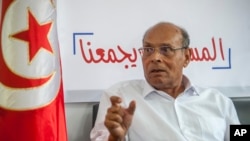A court in Tunisia sentenced former President Moncef Marzouki to eight years in prison in absentia as part of the country's crackdown on opponents of President Kais Saied.
The charges against Marzouki, who lives in Paris, stemmed from remarks he made that authorities said violated laws against incitement and calling for the overthrow of the government, court spokesperson Mohamed Zitouna told Tunisia's state news agency TAP on Friday evening.
His attorney, Samir Ben Amor, told The Associated Press that the sentence illustrates "the hardening of the political line taken by the government against opponents."
Marzouki served as the first democratically elected president of Tunisia from 2011 to 2014, after Arab Spring protests led autocratic President Zine El Abidine Ben Ali to step down and flee the country. A longtime human rights activist, Marzouki has emerged as a vocal critic of President Kais Saied's moves to consolidate his own power and revise Tunisia's post-Arab Spring constitution.
Marzouki's statements, which the court did not specify, amounted to fomenting "an attack designed to overthrow the government, inciting people to take up arms against each other and provoking disorder, murder and pillaging on Tunisian soil."
He has routinely called on foreign powers to withdraw support to Tunisia amid the ongoing reversal of the country's democratic gains and called Saied a dictator who needs to be overthrown.
It's the second time that Marzouki has been sentenced for remarks made at demonstrations and on social media, following a December 2021 four-year verdict for undermining state security.
Marzouki is among more than 20 political opponents who have been charged or imprisoned since Saied consolidated power in 2021 by suspending parliament and rewriting the country's constitution. The president's opponents, including Marzouki, have likened the moves to a coup — a charge that Saied has denied. Voters approved his constitutional changes in a low turnout 2021 referendum.
"Is it normal in a democratic country for someone to be prosecuted simply for having expressed an opinion and point of view on his country's politics?" Ben Amor asked in regard to Marzouki's sentence.
Saied has previously called those who make remarks like Marzouki's "traitors to the nation" and called on authorities to investigate them. Others targeted in his crackdown include Ennahda leader Rached Ghannouchi, businessman and former presidential candidate Nabil Karoui, and Free Destourian Party leader Abir Moussi, a potential challenger in the country's 2024 presidential elections.
"All the achievements of the revolution have suffered setbacks due to (Saied's) seizure of power," Ennahda spokesperson Imed Khemiri said in a statement. "Fundamental liberties have deteriorated, restrictions have been imposed on political party activities, opponents have been prosecuted and the independence of the judiciary has been called into question."









